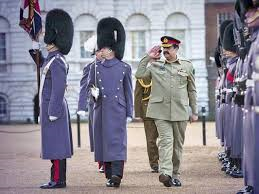
General Raheel Sharif is a very busy man. In particular, he is seen as advancing parts of the National Action Plan (NAP) that sit in his bailiwick. Currently, he is in London for three days and he is meeting people who make things happen. On his first day in the UK, he met British Prime Minister David Cameron and had talks with Secretary of Defence Michael Fallon as well as “other senior officials”, according to reports. The UK is home to a large population of people of Pakistani origin, not all of whom seem to have the best interests of their motherland in their hearts. Of particular concern is an organisation that is banned in Pakistan — the Hizbut Tahrir (HuT) — which is said to have strong support in parts of the UK’s Pakistani population. The army has a particular concern about the HuT as in 2012, four military officers which included a brigadier, were convicted of their links to the HuT. Also present in the UK are several prominent members of the Baloch separatist movement, who give the government another headache.
The purpose of raising these matters with the UK government is to seek its support and assistance in preventing funds being channelled to the HuT and Baloch separatists, as well as exploring the possibility of the UK similarly banning HuT, which is a proscribed organisation in a number of countries other than Pakistan — which may strengthen the argument that General Raheel presents. Given that the HuT has the goal of establishing a global caliphate and considering events in Paris in the last 10 days, any move to limit expansionism by extremist groups must be welcomed.
Baloch separatists have been in the UK for many years, and at least since 2004. The head of the Balochistan Liberation Army (BLA) lives in London from where he often speaks on the Balochistan insurgency, and is reportedly a funding magnet. The BLA is prominent among the several groups active in Balochistan and has claimed responsibility for a number of attacks, including on those people who have settled in Balochistan from other parts of the country. Whether the argument that fighting terrorism is a global responsibility is going to sway the British remains to be seen, but it is the first time Pakistan has reached out and sought help from the British in this way.
On the same day that General Raheel was busy in London, there was a move in Islamabad that may be an indicator of just how far paradigms have shifted since the tabling of the NAP. Many of the terrorist organisations operating in Pakistan get their money from overseas, and some of it comes from Saudi Arabia. Saudi Arabia is a close friend and ally of Pakistan and has been for many years. A fresh facet of that relationship is now being explored and the interior ministry has approached the Saudi embassy in Islamabad to urgently discuss matters relating to the funding by Saudi philanthropists of madrassas and mosques in Pakistan. This is a sensitive matter and will require deft handling, but it comes on the back of a recommendation from a NAP committee that Tehran, Riyadh and the United Arab Emirates all be asked to help stop the funding of groups that are banned in Pakistan and which fan religious and sectarian fires. The interior ministry is to share intelligence reports on foreign funding in support of its request.
Taken together, events in London and Islamabad in pursuit of the goals set out in the NAP are beginning to look like the government is starting to put its money where its mouth is. There have been arrests for the misuse of loudspeakers, hate material has been confiscated in a number of places and now the diplomatic machine is beginning to turn. We welcome these developments, and hope for more of the same.
Published in The Express Tribune, January 16th, 2015.

